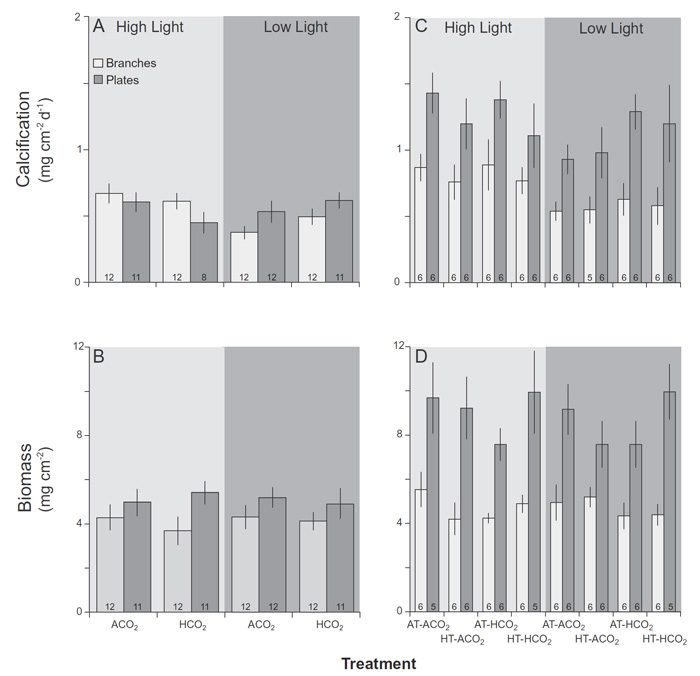| Follow @co2science |
Paper Reviewed
Lenz, E.A. and Edmunds, P.J. 2017. Branches and plates of the morphologically plastic coral Porites rus are insensitive to ocean acidification and warming. Journal of Experimental Marine Biology and Ecology 486: 188-194.
"This study," in the words of the scientists who conducted it, "tested the hypothesis that intraspecific morphological plasticity within a scleractinian coral elicits differential responses to elevated PCO2 and temperature." This they did, finding that "calcification of both morphologies was insensitive to PCO2, as well as the combined effects of elevated PCO2 and temperature." In addition, they report that "mean calcification rates were faster in high light than in low light for both morphologies, and biomass was greater in plates than branches in all treatments."
In further discussing their findings, the two researchers write that their "detection of only Symbiodinium clade C15 in both P. rus morphologies implies high host fidelity, and may contribute to the ability of this coral to withstand elevated temperatures," additionally citing Putnam et al. (2012) and van Woesik et al. (2011) in this regard. And they further note that "traits of P. rus that include a perforate skeleton (Comeau et al., 2014) and a thick layer of tissue (Padillo-Gamino et al., 2012) may contribute to its elevated tolerance of high temperature."
In concluding their paper, therefore, Lenz and Edmunds write that "together, the results of the present experiments demonstrate that P. rus is hardy with respect to the intensity and duration of the treatment conditions tested, and suggest that this species may continue to provide complex reef structure despite seawater warming and acidification expected to occur by the end of the current century."

Figure 1. Mean (±SE) area-normalized calcification (mg cm-2 d-1) and tissue biomass (mg cm-2) of branches (light grey) and plates (dark grey) of Porites rus. Branches and plates were incubated under high and low irradiance in ambient (400 ppm, ACO2) and elevated (700 ppm, HCO2) PCO2 for Panel A and Panel B. In Panel C and Panel D, corals were incubated under ambient temperature-ambient PCO2 (AT-ACO2), high temperature-ambient PCO2 (HT-ACO2), ambient temperature-high PCO2 (AT-HCO2), and high temperature-high PCO2 (HT-HCO2). Source: Lenz and Edmunds (2017).
References
Comeau, S., Edmunds, P.J., Spindel, N.B. and Carpenter, R.C. 2014. Fast coral reef calcifiers are more sensitive to ocean acidification in short-term laboratory incubations. Limnology and Oceanography 59: 1081-1091.
Padillo-Gamino, J.L., Hanson, K.M., Stat, M. and Gates, R. 2012. Phenotypic plasticity of the coral Porites rus: acclimatization responses to a turbid environment. Journal of Experimental Marine Biology and Ecology 434: 71-80.
Putman, H.M., Stat, M., Pochon, X. and Gates, R.D. 2012. Endosymbiotic flexibility associates with environmental sensitivity in scleractinian corals. Proceedings of the Royal Society of London B. http://dx.doi, org/10.1098/rspb.2012.1454.
Van Woesik, R., Sakai, K., Ganase, A. and Loya, Y. 2011. Revisiting the winners and the losers a decade after coral bleaching. Marine Ecology Progress Series 434: 67-76.
Posted 14 March 2017



